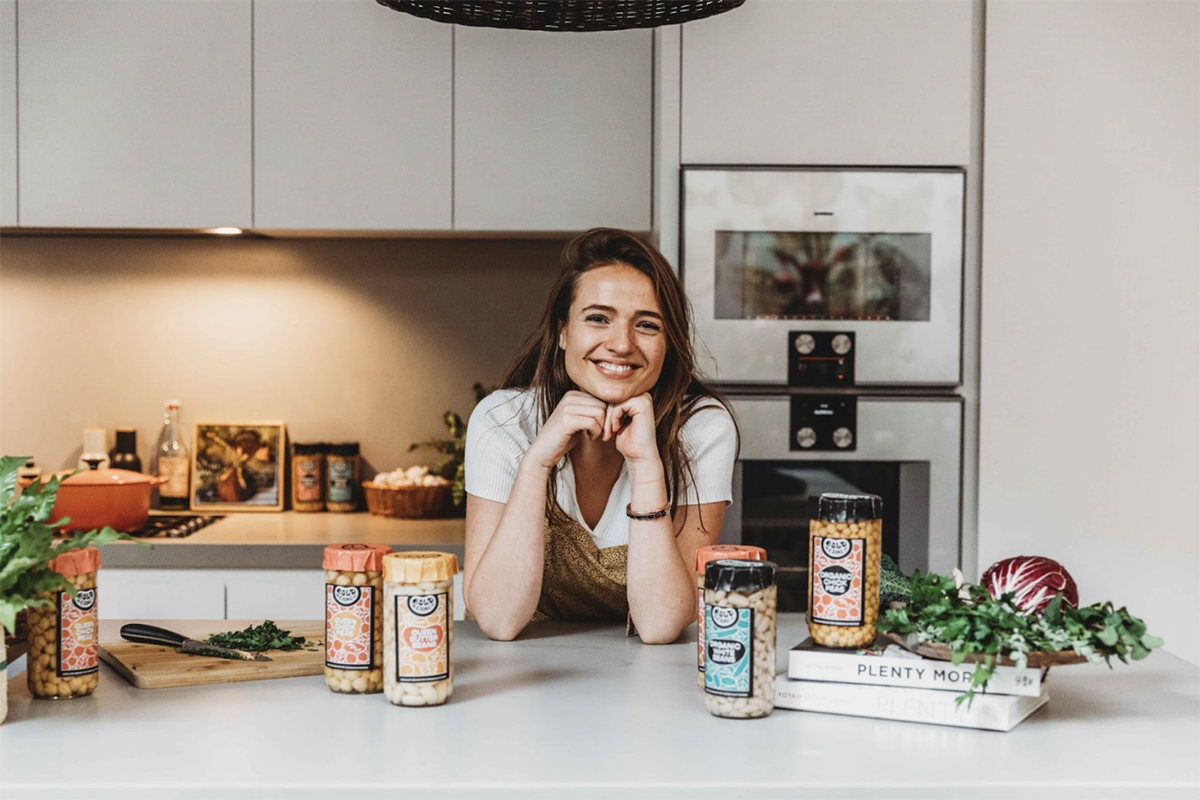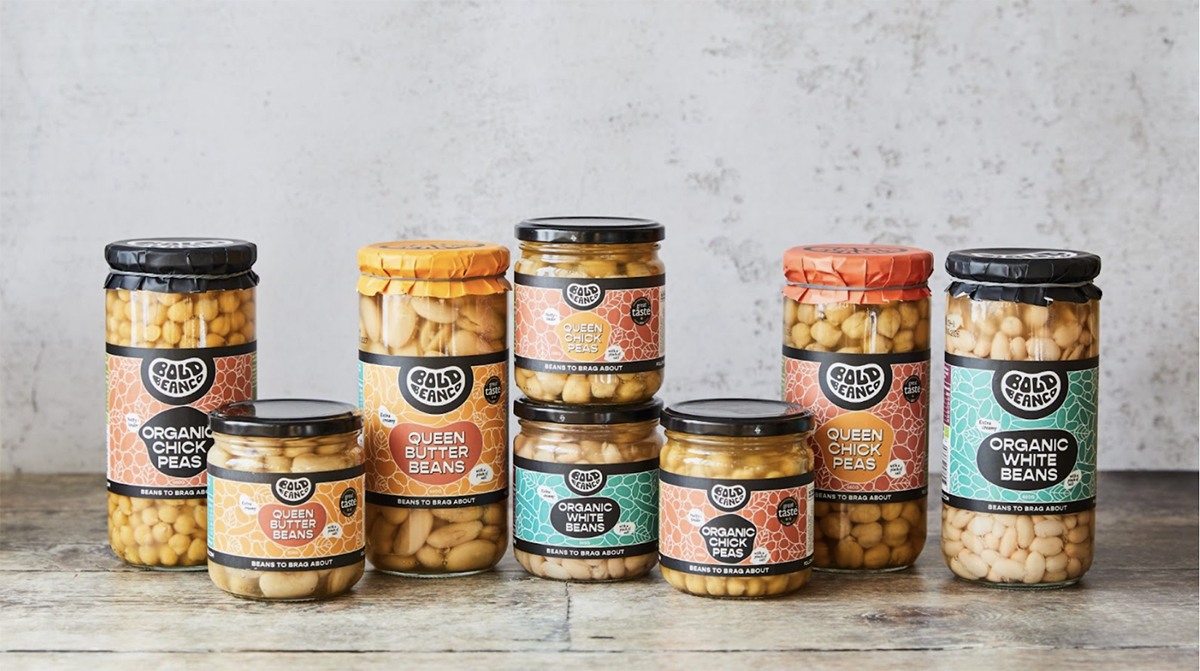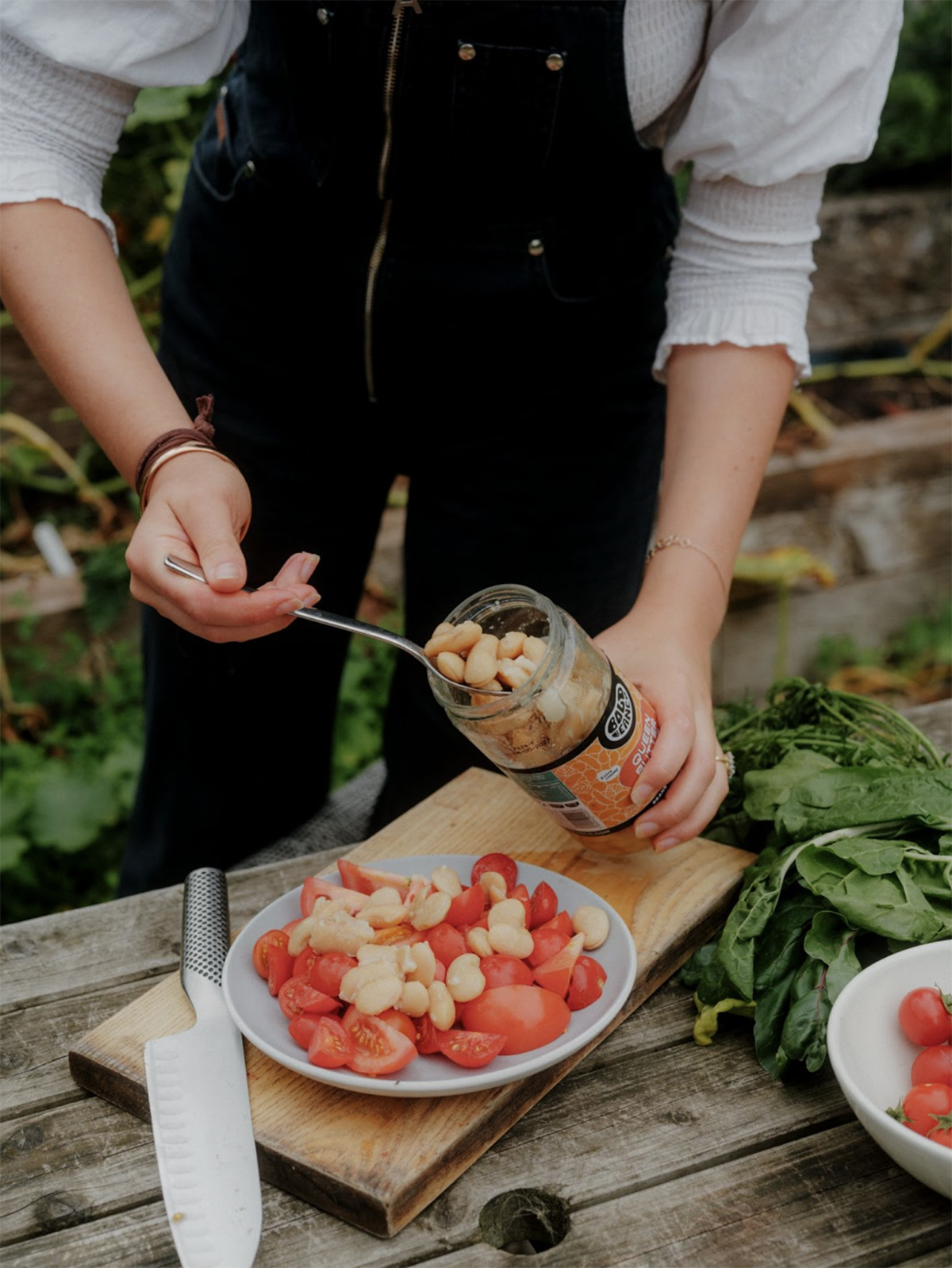November 24, 2022
Amelia Christie-Miller founded Bold Bean Co. with a mission: to make people obsessed with beans. She chats to Lara Gilmour about the importance of a strong brand and why she steers clear of the “vegan” label.


Photo Credit: Milly Fletcher
Bold Bean Co. sells premium jarred, heirloom beans, each specifically sourced from the best possible climate for each one. It has received four Great Taste Awards and is stocked in a huge range of independents around the country as well as recently launching in Waitrose, the company’s first major supermarket listing.
Amelia Christie-Miller didn’t always love beans. In fact, there was a time when she didn’t like them at all. Growing up in the UK, where beans rarely feature on plates outside of a Full English, it’s not difficult to understand why. With her company Bold Bean Co., she is on a mission to educate the British public about how delicious, versatile and environmentally-friendly pulses are.
Amelia was a private chef before starting in the Food Sustainability space, where she worked for a food tech company that linked small producers to some of the top chefs and restaurants in London. “At the same time I was spending time in the food sustainability space and going to a lot of talks about the issues facing food systems like soil quality, meat reduction, and regenerative agriculture,” she explained.
“The more you love food, the more you become interested in how it’s produced, where it comes from and what the impact is. From the research I was doing, I realized that beans were the answer to many of the problems in our food systems, and no one else thought the same. I was like, "Beans are amazing! Why does nobody like them?"
What she learned from working with some of the coolest restaurants in London was that, in the move towards plant-based, chefs were choosing whole ingredients, such as beans, over meat analogs and ‘Beyond Meat’-style burgers: “They were just celebrating beautiful ingredients and using a lot of beans to provide heartiness and satisfaction - something a lot of people see as lacking in a plant-based meal.”
Amelia shares that her self-confessed obsession with beans dates back to her time spent studying abroad in Spain:
“My time in Spain as an Erasmus student fostered my love of food because I had no friends and just cooked all the time! I remember in Nigel Slater's books he recommended these beans from Spain called Judion Runners, so I bought them and lovingly cooked them. I remember tasting one and thinking how delicious they were - far from my childhood memories of baked beans!”
“Later on I realized that this had made me see beans in a new light over the years that followed.”

Armed with a newfound love for beans - particularly, Spanish heirloom beans - and substantial knowledge on their sustainability poteintial, she set about on her mission to convert the British public, launching Bold Bean Co. in 2021:
“I knew I wanted to create a brand that made people love beans. I wondered whether to go down a recipe route – the Brits love baked beans so I thought maybe we’d try to premiumize that category and make eating British beans accessible.”
“Then I realized that, because beans have such a bad perception in the UK, there was still much to do around popularized bean varieties, let alone the more niche, native bean varieties that no one knew about. So I decided to just launch the products that really changed my mind on beans instead.”
Having witnessed the power of a good brand in the food industry, the importance of having a strong identity was clear from the get-go:
“Around the time the food tech company I worked for went into liquidation, Oatly (a brand of oat milks) had transformed consumer behavior and consumption habits within an incredibly short space of time just through being a brand.”
Amelia believes much of Bold Bean’s brand power comes from its authenticity:
“I believe that brands can change the world; we want people to buy into a community. I think why we've seen such success in our marketing is that our campaign came out of simply wanting people to love beans, rather than just saying that we had a product to sell.”
Within one year of launching, Bold Bean Co. has captured the hearts of top chefs such as Joe Woodhouse and Noor Nurad and has made it onto the shelves of huge UK retailers such as Waitrose, Selfridges and Planet Organic. But before they could make people in the UK obsessed with beans, they needed to change some perceptions:
“We realized that one of the major barriers to bean consumption is recipes; because people see beans as vegan hippie fodder rather than anything delicious and aspirational. That kind of worthiness is so prominent in society and it's something we wanted to shake off through our strategy. We don't mention that our beans are vegan, or that they've got potassium and zinc – people already know beans are good for them! The problem is they just don't want them. That’s what we’re trying to change”

Photo Credit: Jack Orton
An integral part of the Bold Bean Co. brand is empowering a new generation of bean lovers through the sharing of inspiring bean recipes through their social media content.
“We want to make beans cool and sexy. That's why we do a lot of the recipe content, which has become such a great resource, helping people to think of beans in a different way. The recipes we create offer of exciting and inventive approaches to cooking with beans that don't feel like a compromise.”
Bold Bean also often shares comments from those they have “converted”: consumers who describe being blown away by the company’s delicious jarred beans.
Source: @boldbeanco
Having been personally seduced by the taste of heirloom beans, Amelia places much importance on provenance. Using the very best beans they can find, she says, means that they need only the smallest amount of preparation; slow cooking in water with a little salt before being jarred.
Bold Bean Co. is championing something that may well be fundamental to the future of plant-based eating: pulses come in thousands of varieties and each one has a different flavor profile depending on where it was grown. Beans, she says, are a fascinating, delicious protein source just as they are - so why bother grinding them down to create a reconstituted burger or meatball? You wouldn’t do that with a Wagyu steak; the same logic should be applied to a Judion bean.
Heirloom beans are already gaining popularity across the US, with companies like Rancho Gordo seeing huge success in their promotion of ancient American varieties through home deliveries of dried pulses. Does Amelia see a similar movement happening in the UK?
“We would love to replicate what Rancho Gordo has done in the United States for smaller varieties of pulses in the UK. We don't think the UK is there yet as people here don't have pressure cookers and don't love beans yet; they're not going to cook beans from scratch. We’re hoping that over the next few years this might change.”
Nevertheless, the plant-based movement is still enjoying success in the United Kingdom. Yet Amelia points out that Bold Bean prefers not to align itself with the vegan label.
“I think that when some brands position themselves as plant-based and healthy it makes people think that they're going to compromise on flavor. That's why we've taken the approach of saying ‘you shouldn't just eat beans because you can't eat meat, you should eat beans because they're delicious.’”
“If you're eating beans because you can't eat meat, that implies compromise; a meat eater might think, well, you can have your beans, I'll stick with my steak. We want people to see that you don't need to be a vegetarian to love beans.”
“A lot of people ask me if our beans are more sustainable than other beans and I always tell them that all beans are good - ours just taste better so you're more likely to eat them. Demonizing mono crops or certain processes is the wrong approach because, at the end of the day, if people are eating beans, that's great.”
At Bold Bean, it’s taste first, sustainability second. And it could be that we are moving towards a future in which more and more people are aware of the environmental benefits of growing and eating more pulses. Along with several other UK brands, including Hodmedod’s, the company is a proud member of the UN FAO ‘Beans is How’ campaign, which was launched this month at COP27 with the aim of doubling global pulse consumption by 2028.
The best way to get people to eat more beans? Spreading the word about the power of pulses. Through Bold Bean Co., Amelia plans to keep educating people about beans. With a cookbook in the works next year - including a foreword from the Beans is How project lead, Paul Newnham - it’s clear that her obsession shows no signs of abating:
“The more you learn about beans, the more proud you are, the better you feel about what you're doing and the happier you are about your diet and the planet. So, it's net positive.”

beans / Bold Bean Co. / heirloom beans / Amelia Christie-Miller / regenerative agriculture / plant-based / Spain
Disclaimer: The opinions or views expressed in this publication are those of the authors or quoted persons. They do not purport to reflect the opinions or views of the Global Pulse Confederation or its members.